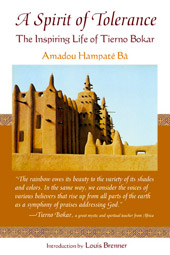|
|
 Follow Wisdom Tales Press
on Facebook
Feature:
Visit our Facebook page for a sneak peak at our books, and more!
The Wisdom Tales Press Facebook page is a great place to learn more about our books and the authors and illustrators who make them. Every day we try to post something new: illustrations from the books, excerpts from the text, links, and, of course, there are always comments from some of our friends!

Click here to join our many friends on the Wisdom Tales Press Facebook page.
|
|
|

Sharing the wisdom and beauty of cultures from around the world
|
|

Available Now
at your local bookseller or your favorite online book retailer. |
| View Sample Pages |
Click on one of the
pdf
icons below to see
sample pages in pdf
format in a new tab
or window |
 pages 110-111 pages 110-111 |
 |
|
|
| A Spirit of Tolerance: The Inspiring Life of Tierno Bokar
|
|
Islam; Sufism |
10 – 11 / Lexile measure: 1140L) |
Paperback |
6" × 9" / 260 pages |
978-1-933316-47-5 |
Available now |
$19.95 |
|
| |
|
In a world where religious faiths are often in conflict, the story of African Sufi Master Tierno (pronounced “Chair-no”) Bokar (1875-1939) should be shared. This book is the first English translation of his biography by his student and it focuses on Tierno’s inspiring life story, and his lessons of religioustolerance in the face of sectarian division and French colonial oppression.
Born in the West African country of Mali, he was known and loved in his community as a Muslim spiritual teacher of deep piety. His life story changed dramatically, however, when religious fanaticism forced him to become an outcaste within his own community. Enduring incredible hardship and suffering, he never ceased preaching his message of religious tolerance and universal love as essential aspects of all religion. These teachings are contained in many of Tierno’s simple yet profound stories, such as “The Rainbow,” “Children of the Same Father,” and “Religion Is One in Its Essence.” |
|
|
- Winner in the Silver Midwest Book Award for “Culture”
|
|
|
“This is an extraordinary book. It should be more widely available for more students and interested persons of all backgrounds.”
—David H Anthony III (Ph.D), Department of History, University of California, Santa Cruz
“The compelling truth of Bokar’s life as a spiritual leader is this: he refused the temptations of intolerance and rigid doctrine. Religion was a process, he believed. One did not dictate or exclude; one examined and questioned.”
—The New York Times, article written by Margo Jefferson
“This easy-to-read book tells the story of Tierno Bokar (1875-1939), a devoted Muslim spiritual teacher who lived and died in what is now Mali. He spent his life teaching others about Islam and God, and yet was brought down by his countrymen’s jealousy, tribalism, and deliberate refusal to understand what was really important in a Muslim’s life.”
—Islamic Horizons, January/February 2008 issue
“Their [two factions in the Tijani Sufi sect] disagreement seems absurd, like all religious disagreements, and it was over whether a certain prayer, the Pearl of Perfection, should be said eleven times or twelve times. And for a few decades people lived in harmony, saying the prayer both ways, and then something happened and it became violent.… Tierno was a man who said, ‘This can’t be right. God can’t want us to kill each other over the question of how we worship God. That can’t be right. So I think we should stop killing each other.’ And he found that—as many people who have done something like this found—that this earned him no friends, that the elevens didn’t like him, and the twelves didn’t like him, and the French didn’t like him, and his family didn’t like him. And he died alone in 1940. And he would’ve died unremembered probably except that the great, great French African writer Amadou Hampaté Bâ wrote a book about his life with Tierno Bokar.”
—Gregory Mosher, Columbia Arts Initiative director
“Above all Tierno Bokar taught—and demonstrated by his own openness—tolerance. Religious quarrels were of no interest to him. He had a horror of ostentation. For him there was only one religion open and common to all, crossing the world, in a diversity of forms, but always unique.”
—Marie-Hélène Estienne, playwright and screenwriter, including The Mahabharata
|
|
|
|
|
|
|
|
|
|
|
Copyright © 2012 World Wisdom, Inc.
|
|
|
|
|